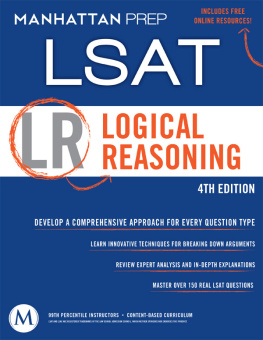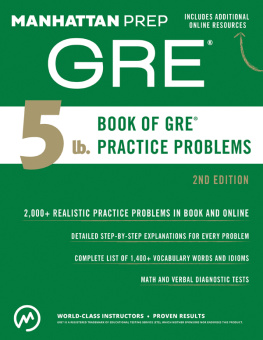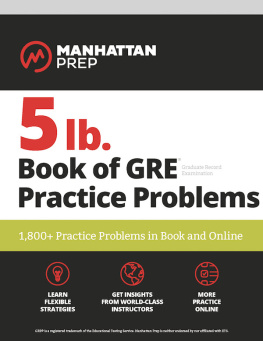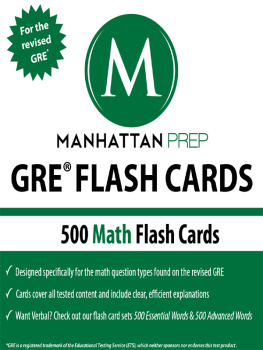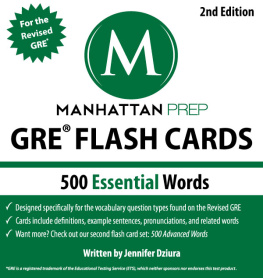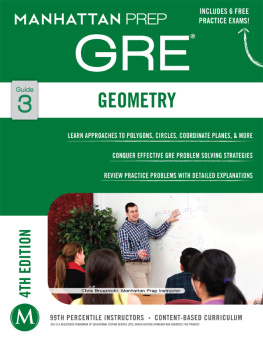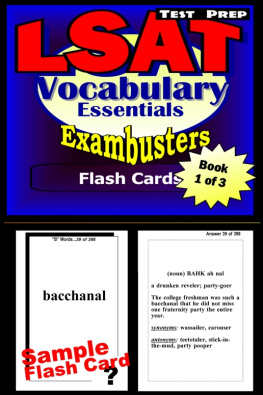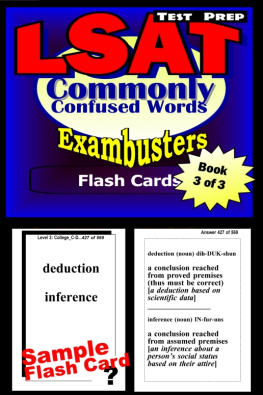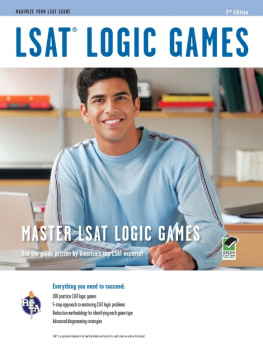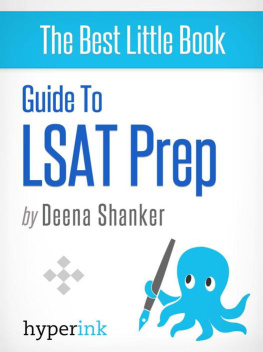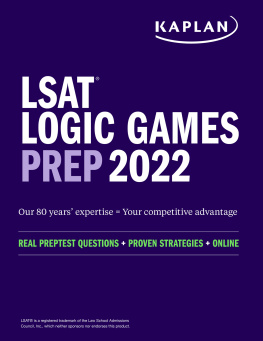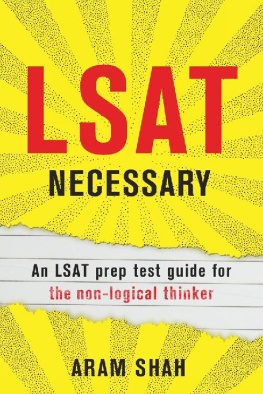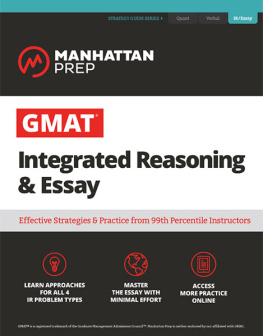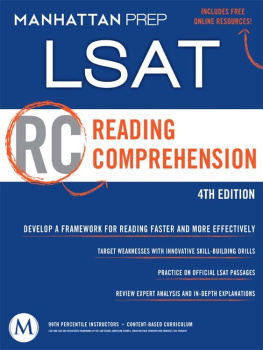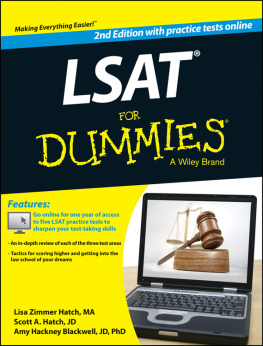Logical Reasoning
The Logical Reasoning section of the LSAT is designed to test your ability to understand and evaluate arguments that are presented in a written form. Each Logical Reasoning question has a shortgenerally two or three sentencesstimulus, a question stem, and five answer choices. Here is a sample Logical Reasoning question:
PT36, S1, Q25
A 1991 calculation was made to determine what, if any, additional health-care costs beyond the ordinary are borne by society at large for people who live a sedentary life. The figure reached was a lifetime average of $1,650. Thus people's voluntary choice not to exercise places a significant burden on society.
Which one of the following, if true and not taken into account by the calculation, most seriously weakens the argument?
(A) Many people whose employment requires physical exertion do not choose to engage in regular physical exercise when they are not at work.
(B) Exercise is a topic that is often omitted from discussion between doctor and patient during a patient's visit.
(C) Physical conditions that eventually require medical or nursing-home care often first predispose a person to adopt a sedentary life-style.
(D) Individuals vary widely in the amount and kind of exercise they choose, when they do exercise regularly.
(E) A regular program of moderate exercise tends to increase circulation, induce a feeling of well-being and energy, and decrease excess weight.
In order to perform well on the Logical Reasoning section, you need strong reasoning and reading skills. Previous academic experience with formal logic can be helpful, but it's certainly not necessary. Much of this book is designed to help you develop and sharpen the reasoning skills the LSAT most rewards. Just as important, if not more so, much of this book is designed to strengthen your reading skills. The one characteristic that is common to all 170+ level test-takers is that they are effective and critical readers.
Where Logical Reasoning Fits in the Big Picture
The entire LSAT exam is comprised of the following sections:

The first five sections can come in any order. The essay will always be your final section, and it will not factor into your overall score.
The experimental section is used for the internal purposes of the makers of the LSAT, and will also not count towards your overall score. It will either be an extra Logic Games, Reading Comprehension, or Logical Reasoning section. We do not recommend that you try to identify which section is experimental during the exam.
Of the four sections that do count towards your score, two of them will be Logical Reasoning. Therefore, Logical Reasoning is the question type that will most significantly impact your performance, and it should be a priority in your studies.
As you will see, certain Logical Reasoning questions are designed to take more time to solve, and certain ones less, but based on the typical number of questions in a section, it's helpful to consider that overall your timing for Logical Reasoning should average out to about 1:20 per question.
In all sections, every question is worth exactly one point. There is no guessing penaltythat is, selecting a wrong answer has the same consequence as leaving an answer choice blankyou will get zero points for that problem. Therefore, it is to your advantage to bubble in an answer for every single question.
In total, you should expect to see about 100 or 101 scored questions. Each correct answer adds one point to your raw score. This raw score is then converted to a score that fits on a 120180 scale, and this converted score will be based on how you performed on your exam relative to how other people performed on that same exam.
Because each pool of test-takers is unique, the conversion scale varies slightlytypically by no more than a point or twofrom test to test.
Here is a sample conversion scale that is representative of the most recent LSATs:
Raw Score
(minimum correct out of 100 total questions) | Scaled Score | Percentile Rank
(percentage of test-takers you outperformed) |
| 98 | 180 | 99.9% |
| 94 | 175 | 99.5% |
| 88 | 170 | 97.5% |
| 81 | 165 | 92% |
| 75 | 160 | 80% |
| 66 | 155 | 64% |
| 56 | 150 | 44% |
Because you'll be seeing about 100 questions, it can be helpful to think of your goal score in terms of the percentage of questions you will need to get correct. For example, if your goal is to score 165, it should be helpful to know that, overall, you'll need to get a little more than 80 percent of the questions correct.
The Logical Reasoning Dichotomy
When it comes to Logical Reasoning, there are some noticeable differences between the common approaches, skills, and attitudes of the average scorer and those of a top scorer:
| Most LSAT Test-Takers | 170+ Test-Takers |
| Fail to recognize the tendencies of the different question types | Know these tendencies and exploit them |
| Don't consider the structure of arguments | Utilize structure to inform understanding |
| Read passively and without direction | Read with a purpose and from a perspective |
| Have difficulty prioritizing key details | Recognize which details are most significant |
| Lack confidence in eliminating incorrect answers | Actively look for wrong answer characteristics and confidently eliminate wrong choices |
| Struggle to assimilate and apply all the tricks and gimmicks they've been taught | Apply their knowledge and understanding efficiently and intuitively |
If you feel like you already have many of the characteristics of a top test-taker, great! If not, don't worrythat's what we're here for. This book is designed to help you develop the skills that are necessary to succeed on the exam at the highest level.
Advice on How to Prepare for the LSAT
It is important to begin your study process with a good plan and the right mind-set. Here is some advice meant to help set you off on the right path:
1. Strive for Mastery.
Mastery means something far greater than simply knowing the right answer. We want you to maximize the learning that you get out of every question that you try. Consider carefully how each argument is constructedhow it is organized, how components are meant to link up, and what some of the built-in traps might be. Consider carefully each answer choicein particular, incorrect answer choices. Don't let yourself off the hook by saying, Oh, this answer is obviously wrong. Imagine that you have to explain the problem to someone who thinks the answer is right. What would you say? Don't let it go until you have a great response. Get to understand a problem to such a point that you feel a hundred percent certain that you could explain the same problem perfectly weeks later. This may seem like a lot of work to put into just one question, but we know that if you truly understand a single problem completely, this mastery will have a significant and positive impact on numerous other questions that you will encounter.
2. Always Consider Process.
Your process is the strategy you use in order to arrive at an answer. Perhaps a more effective way to think about process is that it is the manner in which you choose to apply your understanding and judgment.
Many LSAT problems are like jokes in a certain way: with (good) jokes, punch lines make complete sense after the fact, but leave you feeling like you would be no better at anticipating the punch line the next time you hear a similar joke. Many challenging LSAT questions make complete sense after the factwhen you review the problem and see the clever play on words, or the unexpected link between premisesbut leave you feeling like you would have no better chance of getting that type of question correct the next time you see one.
Next page
